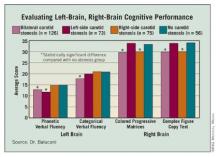NEW ORLEANS – Patients with "asymptomatic" carotid-artery disease may still have important sequelae from their arterial stenosis.
Patients with substantial carotid-artery stenosis and no history of stroke or transient ischemic attack had significant cognitive impairments, compared with people without carotid disease, in a single-center, prospective study of 330 people, Dr. Clotilde Balucani said at the International Stroke Conference.
Notably, patients with severe, unilateral carotid stenosis showed cognitive impairments for functions linked with the brain hemisphere that received its blood supply from an occluded carotid, while the same people with an unimpeded contralateral carotid showed no impairment on cognitive tests that tested their contralateral brain function, said Dr. Balucani, a neurologist at Downstate Medical Center in Brooklyn, N.Y. Patients with bilateral carotid disease had impairments on all of the cognitive tests she used in this study, whereas control subjects without carotid disease showed no impairments on any of the cognitive tests.
"Asymptomatic carotid stenosis may not be truly asymptomatic," she said. "There appears to be an association between cognitive dysfunction and cerebral hemodynamic impairment. Cognitive function could be considered a potential outcome measure, and its improvement by treatment of asymptomatic carotid stenosis may be worthy of further investigation." Adding improved cognitive dysfunction to stroke prevention as another potential beneficial outcome of carotid revascularization may "better help risk stratify patients," Dr. Balucani said.
As of today, no study results have clearly documented that carotid revascularization improves cognition, so this hypothesis needs further testing, she cautioned.
Her study enrolled people during 2005-2010 who had no history of stroke or transient ischemic attack, who were also negative for other markers of poor cognitive function: heart failure, proximal internal carotid artery occlusion, a low score (less than 26) on the Mini Mental State Examination (MMSE), and severe stenosis of an intracranial or vertebro/basilar artery. The study group included 126 patients with ultrasound evidence for at least 60% occlusion of both carotid arteries, 73 patients with this level of occlusion in their left carotid, 75 with this occlusion in their right carotid, and 56 controls without occlusion in either carotid. Patients’ average age was 70 years, two-thirds were men, and their average MMSE score was 27.
All participants underwent assessment by four cognitive evaluations: the phonemic verbal fluency test and the categorical verbal fluency test – both designed to assess cognition in the left brain – and the Raven Colored Progressive Matrices Test and the Rey-Osterrieth Complex Figure Test, both of which assess right-brain function. The researchers also quantified cerebrovascular reactivity during hypercapnia using transcranial Doppler to assess cerebral hemodynamics during breath holding, the Breath Holding Index.
In each of the four cognitive evaluations, patients with bilateral carotid stenosis showed significant impairments, compared with the controls, in both brain hemispheres. In comparison, the patients with unilateral stenosis showed significant impairments only in the brain hemisphere directly connected to their stenotic carotid artery.
A similar pattern occurred in a subgroup of patients assessed for cerebrovascular reactivity. Patients with impaired reactivity in the left hemisphere showed impaired cognition in the two evaluations of left-brain function, whereas patients with impaired reactivity in the right hemisphere showed impaired cognition in the right-brain evaluations.
Dr. Balucani said that she had no disclosures.


